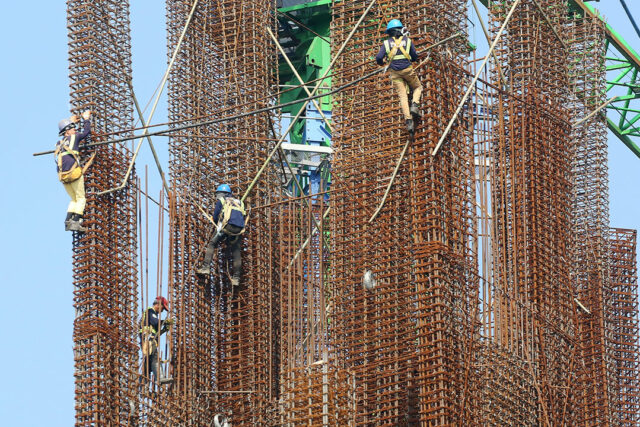Marcos admin urged to develop a roadmap for steel industry

THE Philippine government should push for a development roadmap for the country’s steel industry if it wants to prioritize local construction materials over imports for its infrastructure program, according to a think tank.
President Ferdinand R. Marcos, Jr. recently ordered government agencies to craft guidelines to make domestic building materials preferred for use in the infrastructure program.
Terry L. Ridon, convenor of think tank InfraWatch PH, said the government needs to boost local production of cement and steel, which have struggled to compete with imports.
“The more important question is how can the government further develop these sectors, particularly steel production, which remain dominated by imports,” he said.
The President should provide a roadmap towards developing the country’s steel industry, and this includes expediting the growth of the energy sector as the steel industry is very energy-intensive,” he added.
Mr. Marcos’ office announced the buy-local policy on Sunday following a meeting with the Private Sector Advisory Council (PSAC). He ordered the Trade department to prepare a list of specific construction materials that can be used for government infrastructure projects.
The Department of Budget and Management, through the Government Procurement Policy Board, has also been ordered to complement the “policy of giving preference to local materials” through relevant guidelines.
The construction industry accounted for about 7% of the Philippine economic output last year, according to Statista.
Construction prices in the capital region Metro Manila at the wholesale and retails levels hit their slowest growth in more than a year in September, according to the state statistics agency. It said the wholesale price and retail price of construction materials declined by 2.2% and 1.1%, respectively, year on year.
The government plans to spend 5.3% of the gross domestic product or about P1. 29 trillion on infrastructure this year.
Mr. Ridon said the Philippines’ “overreliance” on imports has a significant impact on its foreign currency reserves and exchange rate.
“Continuous importing of goods, particularly materials needed for our infrastructure program, uses foreign currency, which particularly depletes our dollar reserves,” he noted. “As a function of supply and demand, the more foreign currency used for our import requirements, the greater its price impact on the price of the dollar against the peso.”
Michael L. Ricafort, chief economist at Rizal Commercial Banking Corp., said via Messenger that the government’s buy-local policy on building materials would help narrow the country’s trade deficit.
He said local players need to offer “competitive prices” and ensure “quality standards” to sustain the buy-local policy.
For the first eight months, the trade deficit narrowed to $36.31 billion from the $41.86-billion gap during the same period a year ago. Imports dropped by 9.6% to $84.12 billion, while exports fell by 6.6% to $47.81 billion in the period ending August.
The PSAC meeting was participated in by its chair Aboitiz Group Chief Executive Officer (CEO) Sabin M. Aboitiz, along with members Joanne de Asis, founder of Globe Capital Partners LLC; Manuel V. Pangilinan, CEO of PLDT Inc.; Eric Ramon O. Recto, chairman of Philippine Bank of Communications, Inc.; Enrique K. Razon, president of International Container Terminal Services, Inc.; Ramoncito S. Fernandez, CEO of Maynilad Water Services, Inc.; and Reinier H. Dizon, president of the Cement Manufacturers Association of the Philippines. — Kyle Aristophere T. Atienza



